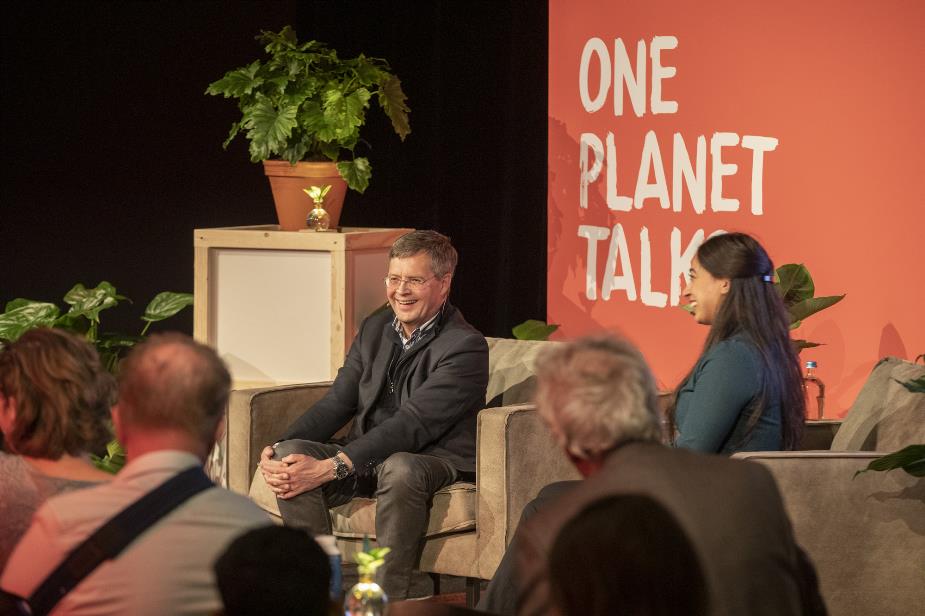Closing of Integrated Reporting subject with former Prime Minister Jan Peter Balkenende
2 May 2022
Accountability is incredibly important if your company is serious about sustainability, but it is also important for demonstrating your long-term viability. The third-year Integrated Reporting subject in the Finance &...

Accountability is incredibly important if your company is serious about sustainability, but it is also important for demonstrating your long-term viability. The third-year Integrated Reporting subject in the Finance & Control degree programme is about exactly that.
To conclude this important subject, on Thursday afternoon, 14 April, a Q&A took place in collaboration with the Museon-Omniversum during the first One Planet Talks, a kind of ‘College Tour Plus’. UN Youth Representative Hajar Yagkoubi was the host, guests were participating companies plus The Hague University of Applied Sciences and the questions were from our own full-time third-year Finance & Control students. The man being asked the questions, the guest, was former prime minister and professor Jan Peter Balkenende.
If you walk past the Museon-Omniversum, you will already see the Sustainable Development Goals, the SDGs. There are 17 of them and these targets apply to all countries. One of the first questions to former Prime Minister Balkenende was therefore: are we able to achieve these goals by 2030? The answer was simple. No. Not even Europe will manage this. According to the former prime minister, concrete and measurable actions are required. On the follow-up question ‘how can we achieve the SDGs,’ the former prime minister made it even clearer: ‘You must keep each other focused. Through the SDGs, we have a common goal as a world. And in stakeholder dialogue, honesty is extremely important. No greenwashing, but also - and this is a sign of strength - the confidence to report what went wrong. Economic thinking is in dire need of change and the interests of society as a whole are becoming increasingly important in those economic decisions. When asked what he could recommend the current cabinet to do: ‘Prioritise the SDGs. This is necessary and it also provides a mutually binding agenda.’
To the question of life lessons: ‘The support of young people in achieving these goals is extremely important. The most important thing you can do is work with passion. Feeling that you can add value in achieving a common goal. And then the bigger picture is also important: both you and the team and the strategy must be good. The key question here is: what do you mean to the other person?
The exhibition in the Museon - which everyone could walk through freely, prior to the One Talks - shows which examples there already are in concrete implementation of the SDGs. And that was also the message of the chair of the One Planet Partner Platform: more companies need to join the course towards fulfilling the SDGs.
With a subject such as Integrated Reporting, our students can help with that. During this subject, students actively work with the SDGs, but also with the other leading frameworks such as GRI and IIRC. Balkenende emphasised the importance of this subject several times. Also, good to know... As of 1 January 2023, it will even be compulsory to account for the company's sustainability in the annual report according to a certain standard, the so-called Corporate Sustainable Reporting Directive. This is no longer a secret for our students, but it still is for many companies.
Afterwards, I asked third-year students Pravita Hanoeman and Denise Merkx what they would take away and remember from this. Pravita: ‘What I take away from the meeting is what Balkenende said. That it is important to increasingly work towards the SDGs, but that organisations must communicate openly and honestly to the outside world. To me, it seems that companies (not all of course) want to present certain facts in a more favourable light, to show that they are doing good things in terms of people, planet and profit, when the reality is a lot less favourable. Openness is important to achieve the objectives, and this must happen as soon as possible.’
Denise takes away the following: ‘What has struck me most is that the companies and we as private individuals are committed to actually becoming more sustainable (even if it is only in small steps). The government should certainly not sit back and do nothing, but it should continue to develop in this area and think about how we can achieve the SDG goals.’
Thanks to Iris van den Akker & Peter de Haan, board members of Museon-Omniversum, and Egbert Willekes, lecturer-researcher of F&C and IFMC, who entered the collaboration and made this closing event possible.
Author: Hanneke van Dam